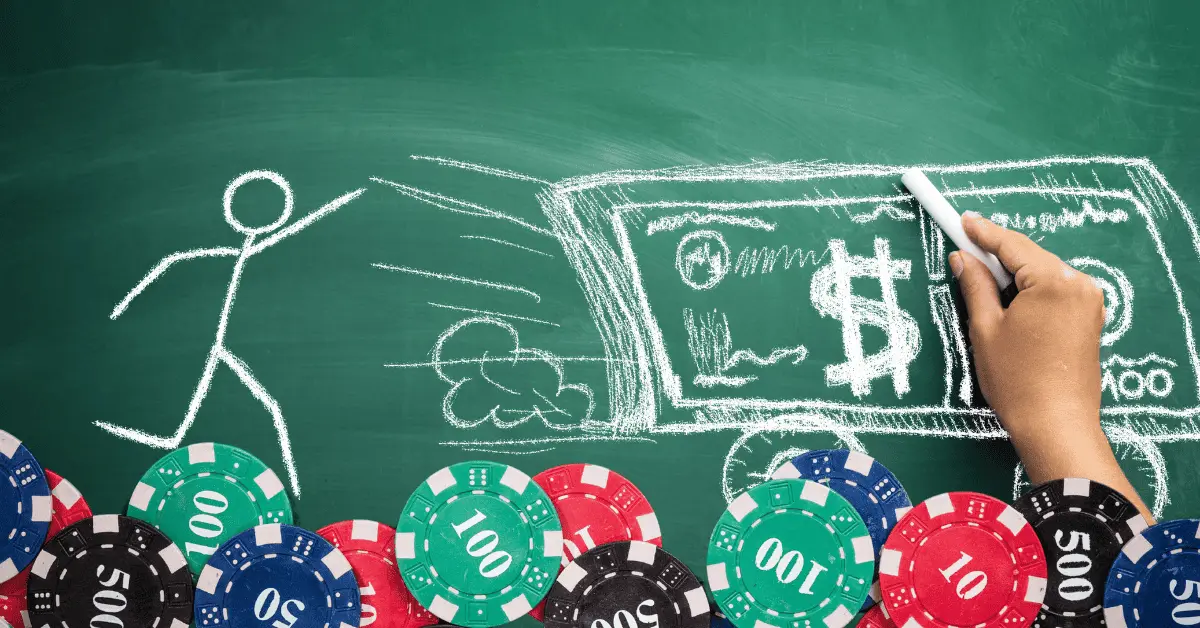Chaos Theory and Sports Betting: Can You Predict the Unpredictable?

Can anyone actually predict the outcome of a game, or are we guessing and at the mercy of fate 100 percent of the time? Welp, it’s a toss up BUT there’s this thing called the chaos theory. It’s a concept that originates with math and science, and it suggests that what seems like randomness may stem from following hidden patterns. It’s kind of like the butterfly effect, which is when tiny, seemingly inconsequential changes can cause rather large and unexpected outcomes.
But how does this relate to sports betting? If we have an understanding of chaos theory, can it help us to make better predictions, or are sports just too unpredictable? We wanna find out! Let’s see how (or if) the theory can give you a better chance at predicting an outcome—or if it’s all random chaos when we gamble on the games!
What Is Chaos Theory?
According to the Fractal Foundation, the official definition of chaos theory is this: “Chaos is the science of surprises, of the nonlinear and the unpredictable. It teaches us to expect the unexpected. While most traditional science deals with supposedly predictable phenomena like gravity, electricity, or chemical reactions, Chaos Theory deals with nonlinear things that are effectively impossible to predict or control, like turbulence, weather, the stock market, our brain states, and so on. These phenomena are often described by fractal mathematics, which captures the infinite complexity of nature. Many natural objects exhibit fractal properties, including landscapes, clouds, trees, organs, rivers etc, and many of the systems in which we live exhibit complex, chaotic behavior. Recognizing the chaotic, fractal nature of our world can give us new insight, power, and wisdom.
For example, by understanding the complex, chaotic dynamics of the atmosphere, a balloon pilot can ‘steer’ a balloon to a desired location. By understanding that our ecosystems, our social systems, and our economic systems are interconnected, we can hope to avoid actions which may end up being detrimental to our long-term well-being.“

In simpler terms, chaos theory deals with how complex systems, even those with defined rules, can behave in mercurial ways. It lays out how even the smallest changes in a system’s initial conditions can lead to insanely different outcomes, all while giving the appearance of randomness—but there’s actually structure underneath it all.
Key Concepts
To get a better handle on this whole chaos theory thing, there are a couple of main ideas that bring it to life. The following concepts explain how unpredictability works and why it might make sense when related to sports betting!
- Butterfly Effect: There is a butterfly that flaps its wings on one side of the world, and that teeny action contributes to a chain of events that results in a storm on the other side of the globe. The concept demonstrates how the smallest, seemingly insignificant changes can have an impact in the future. “This effect grants the power to cause a hurricane in China to a butterfly flapping its wings in New Mexico. It may take a very long time, but the connection is real. If the butterfly had not flapped its wings at just the right point in space/time, the hurricane would not have happened,” explains the Fractal Foundation.
- Deterministic Chaos: Despite what the name suggests, chaos theory isn’t random events. It’s concentrated on systems that, while they are governed by rules, are so intricate that their behavior only appears chaotic. The patterns are there, but they’re extremely hard to pin down or track.
- Relevance to Sports: Sports slot right into this idea. With so many variables at play—players, weather, strategies—sports are a chaotic system where predicting outcomes is incredibly complex but not entirely random.
The Unpredictability of Sports
Sports are fickle by nature—just when you think you’ve got it all figured out, the unexpected can happen. An injury or a sudden change in strategy can turn everything on its head.
Complexity in Sports
A host of factors, like player form, weather conditions, or in-game injuries, makes sports outcomes super hard to predict. There’s always something that can throw off even the best-laid bets.
Randomness vs. Pattern
Yes, sports betting relies on spotting patterns, but the number of variables usually makes outcomes feel totally random. But, a slight adjustment in tactics can completely change the game’s direction.
Examples of Chaos at Play
A great example is the New York Giants’ shocking victory over the undefeated New England Patriots in Super Bowl XLII. Despite the odds heavily favoring the Patriots, a combination of plays and random moments, including the infamous “helmet catch,” led to the Giants’ win—even in a game that is defined and driven by strategy, chaos and unpredictability reign supreme.
Leicester City’s 2016 Premier League win is another perfect example of sports unpredictability. Despite being the definitive underdogs, they defied the odds—the team benefited from a series of seemingly small events that led to their victory. Another one is the Golden State Warriors’ adaptive gameplay, which always shows how unpredictability and flexibility can result in consistent wins.
Applying Chaos Theory to Sports Betting
Sports betting thrives on unpredictability, where any small moment can completely turn the tide of a game. Chaos theory, with its focus on how tiny changes can cause unpredictable results, provides a fascinating lens through which to view this uncertainty. While it may not unlock a foolproof betting strategy, it does help explain why games can take unexpected turns, even from seemingly minor events like a slight player injury or a last-minute coaching decision.
Theoretical Application
Chaos theory isn’t totally about randomness—it’s how small actions, events, or conditions can create a domino effect, which results in more dramatic results. In sports, this could be something as small as a rainstorm that affects the condition of the field or a slight misstep by a player that changes the entire momentum of the game. For those trying to predict outcomes in sports betting, chaos theory can help to highlight how even the tiniest factors can make a huge difference.
Small Initial Changes
The main aspect of chaos theory is the idea that tiny, seemingly insignificant changes can drastically alter the outcome of a system. In sports, this could look like an injury that forces a team to substitute a main player or a last-minute change in the weather conditions. The small, early changes can set off a chain of events that cause outcomes no one could have possibly predicted. Take, for example, a football team losing a star quarterback due to an unexpected injury in the first half of the game. That event could completely alter the team’s strategy and its chances of winning, which changes the odds in ways that would have been impossible to foresee before the game began.
Pattern Recognition
Sports seem to be chaotic in nature, but the chaos theory suggests there are patterns that are hidden within the noise. Bettors usually are looking for trends—like how a team performs under certain conditions or how a particular player tends to behave in certain scenarios. Recognizing these patterns within the chaos is what makes betting so alluring to some. It’s not always random; there are moments where, by understanding previous trends, bettors can make the smartest and most informed decisions. Like if a team consistently struggles in cold weather, or a particular player underperforms after a series of consecutive games. Identifying these types of patterns provides solid insight into future outcomes, even in the midst of chaos.
Challenges
The biggest challenge when applying chaos theory to sports betting is the sheer number of variables that are involved. Every game involves countless factors—player conditions, coaching decisions, weather, crowd energy—that interact in ways that are pretty much impossible to track or model fully. Even the most data-driven bettors will struggle to account for all of these factors. The unpredictable nature of sports, combined with the chaotic elements in each game, makes it really hard to apply chaos theory for reliable predictions consistently. And since most sporting events usually involve random, one-off occurrences that can throw even the most carefully thought-out bets into disarray, it’s a crap shoot.
Yes, chaos theory does give bettors an interesting framework for how to think about sports betting, its practical application is still very limited by the overwhelming number of variables at play. Understanding that little moments can have big impacts is useful, but chaos theory cannot offer any kind of certainty in such a complex system.
Does Chaos Theory Actually Help in Sports Betting?
Sports betting usually feels like a drawn-out battle against randomness, but the chaos theory introduces an idea that could help bettors understand why things happen the way they do—even when they are unpredictable. And although chaos theory won’t magically predict any outcomes, it certainly can give bettors a more nuanced insight into how certain factors that are overlooked might influence the final result. But does it actually have a practical use in sports betting?
Potential Benefits
Chaos theory shows us how even little changes in a system can have larger impacts later on, which could be really useful in understanding the dynamics of sports events.
In theory, chaos theory could result in more advanced predictive models in sports betting by accounting for minute shifts that are usually missed or unaccounted for. Let’s say there is a football game where a dip in a star player’s energy or an unexpected gust of wind changes the entire momentum of a matchup. Traditional betting models might not take these subtle factors into account, but chaos theory stresses that these minor changes can lead to much bigger outcomes. By using sophisticated models that incorporate this kind of thinking, bettors may have a better chance of understanding how various influences could shape the game.
This doesn’t mean chaos theory will mean you’ll be able to predict every change in a game, but it could help bettors create more flexible strategies that acknowledge how unexpected factors can change the outcome of a match. Whether it’s a basketball team playing at a lower altitude or a sudden temperature change that affects a tennis player’s performance, chaos theory encourages bettors to think about the whole picture, which is where all the seemingly trivial factors interact!
Bettors have always been on the lookout for patterns—whether it’s a team’s winning streak or how an athlete performs under certain conditions. Chaos theory goes further by suggesting that even within seemingly chaotic or random outcomes, there are underlying patterns that can be understood if you know just where to look—it’s about trying to find the order in the chaos.
Chaos theory posits that sports are not just random but part of a complex system where numerous variables—like a player’s mood, the crowd’s energy, or a coach’s last-minute decision—interact in ways that can appear unpredictable on the surface. While finding these patterns is far from easy, it could give attentive bettors an edge. Imagine identifying a specific football team that always struggles in the rain or a player who consistently chokes in high-pressure moments. These patterns, hidden within the chaos of the game, might not be obvious at first glance, but with deeper analysis, they can become clear.
When all is said and done, chaos theory doesn’t give you a detailed roadmap so you can consistently win bets. It’s mostly about being aware of the randomness of sports—just like life, it’s always underpinned by a nuanced set of interactions that bettors can study so that they can make the best-informed decisions!
Limitations
Yes, there are possible benefits! But chaos theory also limits what it can do when applied to sports betting.
The very essence of chaos theory tells us that systems are inherently unpredictable—if you account for every tiny factor that could affect a game—injuries, weather, coaching strategies—there are just way too many variables in play to make accurate predictions every time. Sports are influenced by countless factors, many of which are impossible to foresee or quantify, like the psychological state of the players or sudden changes in a game’s flow.
Chaos theory can help us understand why a seemingly minor event can have a huge impact, but it can’t help us predict exactly what that impact will be. For example, an unexpected player substitution could throw off the game’s balance, but knowing that chaos theory exists won’t necessarily help you know how the team will adapt to the change. You can prep for unpredictability, but there isn’t a way to predict the exact form it comes in when it hits.
One of the biggest dangers when applying chaos theory to sports betting is overfitting—placing too much emphasis on patterns that don’t actually hold predictive value. In an effort to find trends within the chaos, bettors might end up focusing on short-term streaks or small sample sizes that don’t have much significance over the long term. For instance, a baseball player might have a hot streak for a few games, but that doesn’t mean their performance will stay at that level.
Similarly, bettors might overinterpret correlations between a team’s past performances and future results, assuming that because something has happened before, it’s likely to happen again. Chaos theory warns us that small changes can have large effects, but it’s crucial not to read too much into every minor fluctuation. Sports are full of noise—random events that seem meaningful but are usually only coincidences.
Chaos theory can add depth to our understanding of unpredictability in sports, but it is in no way a guarantee of success in betting. It gives us a better framework for understanding why outcomes can be so hard to predict, but it doesn’t give us any kind of a clear path to beating the odds. The complexity of sports and its endless variables, makes it almost impossible for any system—chaos theory included—for foolproof predictions.
How Bettors Can Use Chaos Theory to Their Advantage
Chaos theory introduces a way of understanding how unpredictable outcomes can still have underlying patterns, which can be a useful mindset for bettors. Although it’s not a cure-all for sports betting, there are a few ways you can incorporate some of its ideas into your strategy!
Practical Tips
Knowing how chaos theory can apply to sports betting means recognizing that even the most unpredictable systems hide patterns. The following tips can help bettors negotiate all of the uncertainty with a little more confidence!
- Find Patterns in Unpredictability: Chaos theory teaches us that even in chaotic situations, trends can emerge. Bettors can benefit by watching for recurring circumstances that might provide insights. For instance, a football team might struggle in rainy conditions, or a player might have a pattern of underperforming when recovering from an injury. These are the types of patterns bettors can use to make more informed decisions. By focusing on such patterns, you’re not expecting perfect predictability, but you’re gaining a slight edge by noticing trends others might overlook.

- Be Flexible: One of the main takeaways from chaos theory is that unpredictable events can turn the tide. In sports betting, it’s super important to be adaptable. Conditions in sports change at the drop of a hat, whether it’s due to weather, injuries, or last-minute substitutions. Keeping an open and flexible mindset and being ready to adjust your bets as new info comes in is a must. Betting without room for flexibility makes you way more vulnerable to any unexpected changes.
- Avoid Overconfidence: It’s really easy to fall into the trap of thinking you’ve found a foolproof pattern, but chaos theory is an annoying reminder that even patterns will be unpredictable. Just because a team has a streak of wins or a player is performing well under certain conditions doesn’t mean it will always happen that way. Approach any patterns with caution, and know that while they can help guide your bets, they don’t give any kind of certainty. Balance all of your insights with a healthy dose of skepticism.
Technique Examples
If you think that chaos theory seems like it’s too complicated for everyday betting, it might not be for you! But if you want to test it out, there are practical approaches that match up with its principles. Below are some strategies to consider that could help you spot patterns or react to sudden changes better!
- Pattern Recognition and Statistical Models: Bettors can apply chaos theory by using more sophisticated statistical models to look for trends. For example, instead of simply looking at win/loss ratios, dig into more detailed data, such as how a team or player performs under specific circumstances—like away games, particular weather conditions, or after a loss. The more intricate patterns might give you a slight advantage by identifying overlooked trends.
- Adaptability with In-Game Betting: Live betting is a really good way to apply the lessons of chaos theory. Since chaos theory is about adapting to changes, in-game betting allows you to shift your strategy as new events unfold. If a main player gets injured or weather conditions suddenly shift, you can adjust your bets in real-time, reflecting the new situation.
Chaos theory won’t guarantee success, but it does encourage bettors to stay open to patterns and be adaptable in times of uncertainty. By looking for emerging trends, being flexible, and not getting overconfident, bettors can apply the principles of chaos theory to make the most informed decisions in the sometimes crazy world of sports betting.
Counter Arguments: Is It All Just Pseudoscience?
Chaos theory sure feels like an exciting idea for bettors who are looking to crack the code of unpredictability. But not so fast: everyone is far from convinced. Some argue that although chaos theory is for sure a fascinating concept, applying it to sports betting might be more of a wishful thinking situation than a practical one.
Skeptic’s Viewpoint
A lot of skeptics genuinely feel that chaos theory complicates what is basically a game of chance. The theory focuses on how tiny factors tend to be the cause of unpredictable outcomes, but critics argue that sports betting has way too many variables to make this idea a useful one. Yes, chaos theory can work in systems where conditions are super controlled, but sports are a much messier world with random human decisions, unexpected events, and external factors like the weather. Because of this, trying to apply such a complicated scientific theory to sports betting will probably be more confusing than enlightening.
Randomness vs. Deterministic Chaos
One of the biggest distinctions that chaos theory relies on is the difference between true randomness and chaotic systems. Chaos theory applies to systems that, while they may appear random, are actually governed by underlying rules. Sports, on the other hand, are far more unpredictable. For example, a sudden injury or an unexpected weather change can completely shift the outcome of a game. Critics argue that these are purely random events that chaos theory isn’t designed to handle. Chaos theory works well for things like predicting the weather, but trying to apply it to the wild world of sports can feel like you are trying to force a square block into a round hole.
Balanced Perspective
Chaos theory does give us an interesting way to think about unpredictability, but it’s really important to keep things in perspective. Sports are erratic by nature, and while chaos theory does help to explain why things can go off the rails, it doesn’t give a reliable way to predict what’s coming down the pike. Bettors can certainly benefit from understanding the limits of prediction and being flexible, but expecting chaos theory to solve the puzzle of sports outcomes is asking way too much.
Chaos theory does indeed add an interesting layer to understanding sports betting, but it’s far from a surefire strategy. Betting still takes a blend of skill, analysis, and luck, but chaos theory does provide a sort of framework to understand randomness—but you can’t control it.
Conclusion: Controlled Chaos
Chaos theory gives us a different way to think about sports betting—it brings a sort of structure to unpredictability, but it’s far from a silver bullet. It can explain how small, unexpected events will ripple into bigger consequences, but sports betting is still full of surprises that no theory can ever predict. Chaos theory can help you understand the chaos, but it will never erase the uncertainty that comes with sports betting!
Here’s a quick recap of the main points we covered above:
- Chaos Theory and Betting: Shows how seemingly minor events can have major effects on game outcomes, though its practical use in betting remains debatable.
- Skeptics’ View: Critics argue that trying to apply chaos theory to sports betting overcomplicates something that is largely driven by chance.
- Randomness vs. Chaos: Highlights the main difference—chaos theory deals with systems that follow certain rules, while sports often involve pure randomness.
- Balanced View: Chaos theory does help make sense of unpredictability, but it’s not a reliable betting strategy on its own.
Chaos theory does come with some interesting insights, but betting on sports will always come with a decent amount of randomness. It can be a useful tool for thinking through how unexpected events shape outcomes, but it’s not something you should totally rely on! In the arena of betting, you’ll need a combo of strategies, intuition, and, of course, luck to come out on top.

Matthew specializes in writing our gambling app review content, spending days testing out sportsbooks and online casinos to get intimate with these platforms and what they offer. He’s also a blog contributor, creating guides on increasing your odds of winning against the house by playing table games, managing your bankroll responsibly, and choosing the slot machines with the best return-to-player rates.








